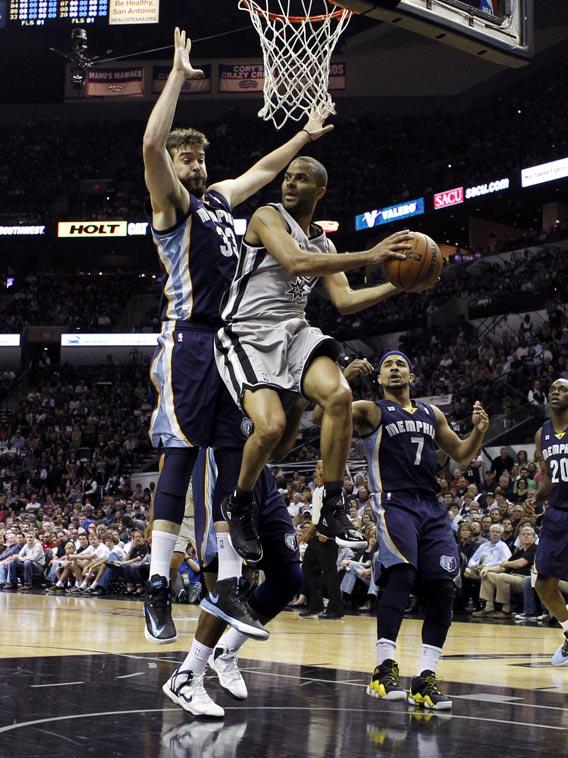Saturday night, I’ll be watching the San Antonio Spurs attempt to go up 3–0 against the Memphis Grizzlies in the NBA’s Western Conference Finals. Leading the charge will be the Spurs’ Belgian-born point guard Tony Parker, Brazilian power forward Tiago Splitter, and Argentine sixth man Manu Ginobili.* Boris Diaw, also from France, should get major minutes off the bench as well. The Grizzlies have a much more heavily American roster, but their stifling defense is anchored by Spanish center Marc Gasol.
While I watch, I’ll continue to be frustrated by the debate over the part of the immigration bill relating to visas for skilled workers. When it comes to professional basketball, we manage to get this question exactly right. But when it comes to the larger—and much more economically significant high-tech sector—we keep losing our way.
The crux of the problem is the deeply misleading rhetorical fixation on the idea that there’s a “shortage” of skilled computer programmers and other engineers in the United States. This is the main claim of the tech companies that want an increase in the quantity of H-1B guest worker visas and less burdensome bureaucratic process for obtaining them. Economists at union-friendly think tanks counter that there’s in fact a glut of skilled workers in the country already and any tech company that needs more STEM workers can just offer higher wages.
In fact, this entire debate is a red herring. We’ve been duped by our deeply flawed visa system.
America’s thriving professional basketball sector points to a better way. Athletes—whether in the NBA, NHL, or other major league sport—get what’s called a P-1 non-immigrant visa for internationally recognized athletes. A key feature of the P-1 process is that it does not require the athlete or his employer to document that it was somehow “impossible” to find a qualified American for the position. What you need to show is that you’re a bona fide, highly ranked athlete with a legitimate athletic job offer in the United States. Even though extremely tall men are clearly rare, it’s obviously not the case that the Grizzlies and Spurs would be unable to find American big men willing to check Zach Randolph and Tim Duncan for multimillion-dollar salaries. In fact, since the number of NBA teams and NBA players is essentially fixed, skilled basketball immigrants are a rare case where we can very clearly say that imported labor causes disemployment among native-born Americans.
And yet there’s little agitation to end P-1 visas. And the case for granting them is extremely strong. Letting general managers hire the best workers they can find makes for the best possible games.
That’s not just good for profit-hungry owners (and it’s very good for them), it’s good for fans. It’s also good for the larger American economy. NBA games and NBA-branded apparel are exported globally because the play quality is the best in the world. And as long as we stay open to skilled basketball immigrants, we’ll likely never lose that lead. Great players may be born and raised abroad, but they’ll always want to test themselves against the best of the best by coming to our shores. In a small way, this open door helps keep America strong.
The problem with tech guest-worker visas is that they’re too restricted. On the one hand, employers need to engage in the farce of claiming that no Americans can be hired for the job. On the other hand, imported workers are tethered to their sponsoring employer like indentured servants. This creates a political debate focused on phantom shortages. But we should want skilled computer programmers to come to America for the same reason we want Tony Parker to come to America: Letting companies hire the best people regardless of national origin helps build a strong technology sector. And a strong technology sector is good for America. It’s an important export industry and it creates lots of secondary employment.
The country should welcome as many skilled workers as would like to move here and work, and not fuss about whether there’s “really” a shortage or not. Set a rule for minimum salary and education credentials to ensure that the program is genuinely being used for skilled workers who won’t burden the welfare state. In exchange, don’t tether visa recipients to a specific employer. The cramped and narrow terms of H-1B indentured labor have created a distorted debate. Skilled workers, whether in technology or in basketball, are good for the country.
Correction, May 24, 2013: An earlier version of this article said that Parker was born in France; he grew up there and plays for the French national team but was born in Belgium. (Return to the corrected sentence.)
